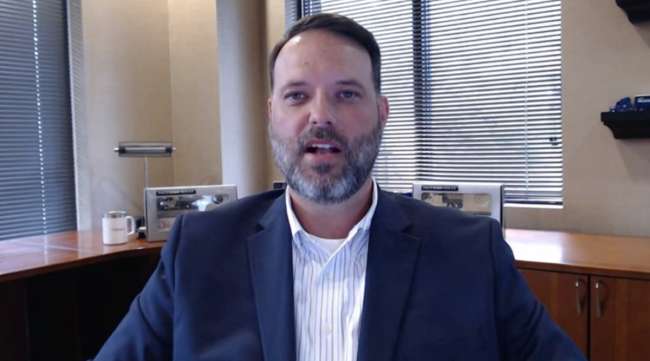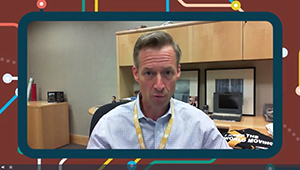Managing Editor, Features and Multimedia
Trimble Aims to Streamline Supply-Chain Collaboration

[Stay on top of transportation news: Get TTNews in your inbox.]
Trimble Transportation has set out to create a more seamless and transparent supply chain by enabling closer collaboration among carriers, shippers and third-party logistics providers.
The trucking technology supplier outlined this more holistic vision for the transportation industry at its 2020 in.sight user conference, which the company hosted virtually due to the coronavirus pandemic.
While the company continues to develop its various product lines, which include back-office software, truck telematics, digital mapping and freight visibility, it also will work to bring them all together and better connect different elements of the supply chain, said James Langley, senior vice president of Trimble Transportation.
We have officially kicked-off our virtual edition of in.sight user conference + expo! Where are you joining us from this year? #insightuc pic.twitter.com/gUqCzkKBTq — Trimble Transportation (@Trimble_Trans) August 24, 2020
“As we solve the challenges of tomorrow, it gets beyond just optimizing the pieces, but also connecting and collaborating and optimizing the whole,” Langley said during the Aug. 24 opening session of the online conference.
He characterized Trimble’s January acquisition of Kuebix, which offers a transportation management system for shippers, as “a step in that direction.”
RELATED: Telematics Industry Starts 2020 With Major Investment, Acquisition
Kuebix serves more than 20,000 shipper customers, while Trimble provides technology for 1.3 million connected trucks in North America, Langley said.
“If we can bring you together in a way you can solve problems, we can digitize, automate different parts of the solution,” he said.
As Trimble works to enable a more connected future, transportation companies continue to face daunting challenges associated with the COVID-19 outbreak.
Many fleets have been squeezed financially while dealing with freight disruptions and implementing new processes designed to keep employees safe and lower infection rates. In addition to constant cleaning efforts, many companies have moved most of their office staff to a remote-work environment.
During the conference, several of Trimble’s fleet customers described how they are weathering the storm during the coronavirus pandemic.

Bison Transport Chief Administrative Officer Mike Ludwick said Bison has sharpened its analytics to make better business decisions. (Seth Clevenger/Transport Topics)
Bison Transport has focused on making better business decisions through improved data analytics, said Mike Ludwick, the company’s chief administrative officer.
“We all know there are both good opportunities and not so good ones. We’ve adjusted and sharpened our analytics so that we can actually tell the difference,” he said. “By using that data and adding in a bunch of hard work, we’ve been able to keep our drivers busy and set our business up for our next round of growth.”
Bison Transport ranks No. 56 on the Transport Topics Top 100 list of the largest for-hire carriers in North America.
Technology also has helped Maverick Transportation remain agile while responding to the pandemic, said Wayne Brown, Maverick’s vice president of information technology.

Maverick Transportation VP of Information Technology Wayne Brown said Maverick has used its telematics data to create tracing reports for COVID-19. (Seth Clevenger/Transport Topics)
The company utilized its telematics data to create tracing reports for its customers and drivers about potential exposure, he said.
“I also think coming out of this we have an opportunity to look at things differently and do things in a more effective and efficient manner, like paper-free workflow,” Brown added.
Maverick USA ranks No. 76 on the for-hire TT100.
While working through all of these challenges, companies should never lose sight of what matters most, said Brad Aimone, director of driver safety and services at Central Oregon Truck Co.
“Coronavirus has got all of us greatly concerned — our employees, our families, our coworkers, our peers in the industry. Please make sure that at the end of the day, it’s about the people that we all work with and work for,” he said.
The transportation industry has become an increasingly important business sector for Trimble, a global technology firm that also serves industries such as agriculture and construction in countries around the world.

Painter
Rob Painter, who became Trimble’s CEO in January, told attendees that the company remains fully committed to the transportation space.
“We believe in our ability to transform how the supply chain works today and unlock value for you and for your customers,” he said. “We know the industry lacks visibility, data integration and collaboration. This is work we do at Trimble.”
Painter, who succeeded Steve Berglund to become Trimble’s third CEO in its 42-year history, was previously the company’s CFO.
Kuebix was the latest in a series of major acquisitions by Trimble in the transportation technology space over the past decade. Other purchases include PeopleNet, TMW Systems, ALK Technologies and 10-4 Systems.
Through those acquisitions, Trimble has assembled a broad portfolio of transportation technologies, including transportation management systems for both carriers and shippers, as well as telematics, mapping software, freight visibility, asset maintenance and onboard video.

Natural gas and propane join electric power as alternatives to diesel. Host Seth Clevenger talks with Chad Lindholm of Clean Energy and Stuart Weidie of Alliance Autogas. Hear a snippet, above, and get the full program by going to RoadSigns.TTNews.com.
Moving forward, a central element of Trimble’s strategy for the transportation industry is to create a connected platform that makes all supply-chain participants more efficient, said Dan Clark, founder of Kuebix and vice president of product innovation and strategy at Trimble Transportation.
Much of that efficiency will come through expanding the company’s customer base and the scale of its platform.
“The more people that become part of our community, the faster and the quicker it grows and the more opportunities are realized by each stakeholder,” Clark said.
At the same time, though, it is important for both shippers and carriers to have an “agnostic platform” that connects to “everything and everyone,” he added.
Illustrating that stance, Trimble announced a new collaboration with Omnitracs, which is both a competitor and a longtime integration partner. The companies said they have integrated Trimble’s TMW.Suite transportation management system with the Omnitracs One platform to support joint customers.
Want more news? Listen to today's daily briefing:
Subscribe: Apple Podcasts | Spotify | Amazon Alexa | Google Assistant | More




